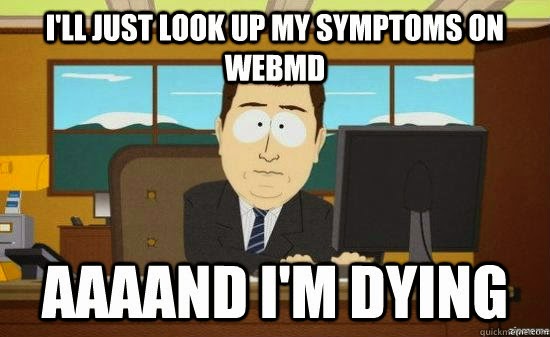One problem with Internet information is the sometimes suspect quality [link]. But even with reliable and accurate sources, there is the bigger problem that all of this information does not equate to knowledge and understanding. I recently read an essay in Slate titled "WebMD Knows Best" that discusses the challenges of interpreting all of this online medical content:
"What’s missing from online medical sites isn’t just good information; it’s all the context and expertise needed to interpret it. Because we are increasingly well-educated and tech savvy, we have access to much of the same information that doctors do. In the age of WebMD, it’s easy to see why we increasingly view ourselves—and have started to behave—more like doctors-in-training than traditional patients. And this isn’t necessarily a bad thing. Patients with more information about their conditions and treatment options are ultimately more proactive and better patients—but only if they have the right information and only if they use it to engage in a productive dialogue with their doctors."
Part of the challenge derives from the fact that medical websites do not always do a good job of providing the context and perspective of how the information applies to a particular person. Without domain expertise (i.e. medical training), a reader can easily reach the wrong conclusions (Figure 1). In the future, I predict that online sites and apps will become more helpful as they learn more about the medical background of the person via user input (e.g. user response to questions), smartphone sensors (link), and even interfacing with medical records (after obtaining user approval), and then integrating this information to make personalized recommendations using Artificial Intelligence and medical databases.
But more importantly, this information should not be used as a substitute for interacting with medical professionals. Instead, it should be used to conduct more productive communications with your doctor. Online medical information can be very helpful but should not be used in isolation to make important health decisions. It is very important to rely on the expertise of your doctor(s) who have been professionally trained. In her personal essay describing the decision to have her ovaries removed to prevent ovarian cancer, Ms Angelina Jolie states that "Knowledge is Power." The way of achieving this knowledge is by paying close attention to and heeding the recommendations of her team of doctors who are familiar with and understand the details of her case.
As I state above, one day Artificial Intelligence may produce automated diagnosis that could be available online (to help both you and your doctor), but that day is still far in the future. In the meantime, your online medical investigations should be helping you have a more productive dialogue with your doctor.
Figure 1. WebMD knows best? Not yet. Ultimately you want to consult with your doctor.

No comments:
Post a Comment